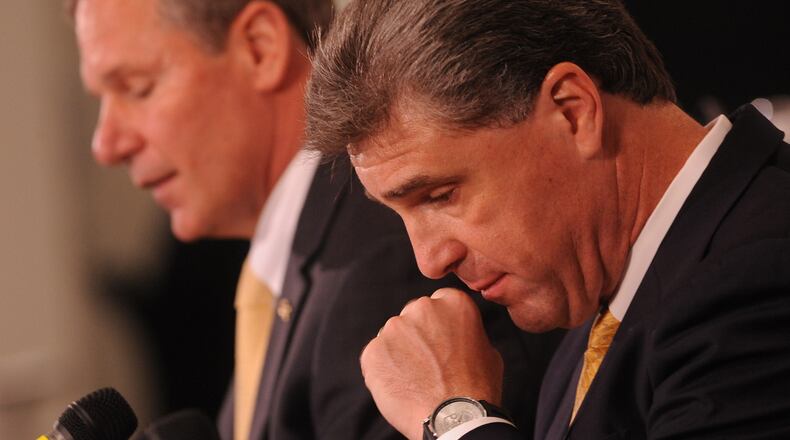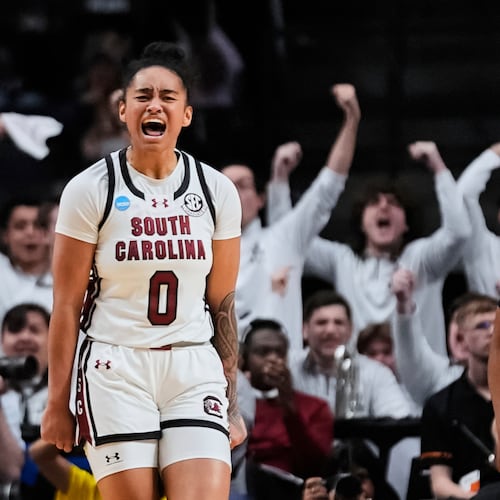The Ramblin’ Wreck will not lead a parade down Techwood Drive. No confetti cannons will be shot in McCamish Pavilion. But Thursday nevertheless will be a noteworthy day — Georgia Tech will complete its six-year sentence on NCAA probation.
The day will be the final ounces of penalty paid by the school for two embarrassing infractions, both of which were entirely avoidable. For Tech, not much will change procedurally. But it’s undeniable that, whatever one’s opinion of the NCAA, the penalties that Tech paid had the intended effect — to improve its ability to be compliant with the NCAA rulebook.
The end of probation is “certainly a wonderful opportunity to look back and reflect on the progress we’ve made,” said Shoshanna Engel, Tech’s top compliance officer, at a June board meeting of the Georgia Tech Athletic Association.
A refresher: In July 2011, Tech was put on probation for four years, stripped of its 2009 ACC football title, fined $100,000 and found to have failed to meet the conditions and obligations of NCAA membership. The punishment stemmed from an impermissible-benefits investigation into former Tech football star Demaryius Thomas for receiving $312 worth of free clothing from a representative of a sports agency.
The NCAA’s punishment centered more on Tech’s response to the investigation, which the governing body said was combative and confrontational.
In July 2014, Tech’s probation was extended two years after coaches in football and men’s and women’s basketball were found to have made hundreds of impermissible phone calls and text messages to recruits in 2011 and 2012. The NCAA found that many of the impermissible calls were inadvertent mistakes that didn’t seek to gain a recruiting advantage. Instead, they were the result of erroneous advice from the compliance staff and a mistaken belief about their responsibility to log calls after a monitoring system was implemented.
The investigation, initiated by Tech, led to the resignation of an assistant football coach who acknowledged that he had disregarded rules regarding text messaging. Part of the actions taken in response were to increase the compliance office from two employees to four.
“We didn’t have all the systems we should have had in place, we didn’t necessarily have the right personnel, and more importantly, I don’t think there was a clear, strong message that this is unacceptable,” said former Tech senior associate athletic director Paul Griffin of the attitude toward compliance during both infractions.
Griffin credited former AD Mike Bobinski for helping create more effective monitoring systems and instilling a stronger culture of compliance. Griffin retired in 2013 following Bobinski’s hire, but came back to Tech in 2016 to serve as interim AD after Bobinski left for Purdue. Upon his return, Griffin noticed a difference in attitude toward following the NCAA rules.
“I had a feeling that everybody understood that there was a system-wide commitment and obligation and responsibility that we were going to have to be sure that, especially during the period of probation, we were mindful of every single I and T and all those kinds of things,” he said.
He compared it with a driver going through a neighborhood and staying under what he assumes the speed limit to be vs. one who first makes sure what the speed limit is before driving. Griffin praised Engel for how she and her staff have engaged with coaches in answering rules questions, not simply answering the question asked, but covering all the bases.
“They’re just easy to work with, very accessible, have good attitudes,” Tech assistant basketball coach Darryl LaBarrie said. “We don’t have any issues with them at all.”
Engel said that compliance has become foundational to the culture in the athletic department.
“By that, I mean that we build the idea of compliance into everything we do,” she said.
Coaches continue to commit sporadic infractions, but they’ve been minor, typically inadvertent and usually self-reported. Violations are almost inevitable because of the intricacies of the rulebook. Engel said that the texting and calling infractions would not happen now because of monitoring software that the department implemented.
Besides probation, the fine and the vacating of the 2009 ACC football title, other penalties included bans on making recruiting phone calls for a certain time period, which have been served. Tech was required to inform football and men’s basketball prospects that the school was on probation and publicize its status in those sports’ media guides.
It has had to submit an annual report to the NCAA with an update on progress made in policing itself against the infractions that led to the sanctions.
One such improvement was creating stronger relationships with various entities on campus, such as the offices of the president, legal affairs, enrollment services and the registrar.
“Developing those systems allows us to catch anything before it slips through the cracks, so we’re not working as two separate entities, we’re truly working together,” Engel said.
At the time of the 2014 infraction, Bobinski said that “we are resolved that it will never happen again.”
That responsibility now falls to his successor, Todd Stansbury, and his four-person compliance team.
“They just keep us well informed on what we can and cannot do, and it’s our job to go comply with it,” LaBarrie said.
About the Author
Keep Reading
The Latest
Featured




